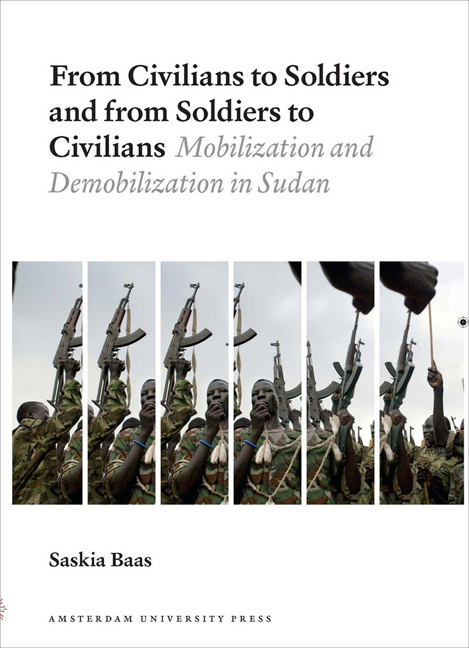Book contents
- Frontmatter
- Dedication
- Contents
- Acknowledgements
- List of Acronyms
- 1 Introduction
- 2 Recruitment
- 3 Becoming a soldier
- 4 At War's End
- 5 DDR Policies and Realities in Sudan
- Concluding Remarks
- Appendix I: Checklist Interviews Former Combatants
- Appendix II: Example of an Interview Report
- Notes
- Bibliography
- Index
Appendix I: Checklist Interviews Former Combatants
Published online by Cambridge University Press: 15 January 2021
- Frontmatter
- Dedication
- Contents
- Acknowledgements
- List of Acronyms
- 1 Introduction
- 2 Recruitment
- 3 Becoming a soldier
- 4 At War's End
- 5 DDR Policies and Realities in Sudan
- Concluding Remarks
- Appendix I: Checklist Interviews Former Combatants
- Appendix II: Example of an Interview Report
- Notes
- Bibliography
- Index
Summary
Background
a. Name, age, gender, married/live with family, tribe, education?
b. Affiliated to which movement and since when?
c. Enrolled in formal DDR program?
Before joining the movement
a. Which area did you live in before the war started?
b. What was your main source of income/livelihood?
c. What was the composition of the family you were part of and what was your role/responsibility?
d. In your experience, what were the reasons the war started?
e. What was the most important issue (political) in your opinion?
f. What effects did the war have on your community and your life (e.g. security, livelihood, food security, death of a relative)?
g. How did you get in touch with the rebel movement (e.g. as a result of active or forced recruitment by the movement/through peers who joined the movement/through own initiative)?
h. What did you know about the activities of the movement and why did you decide to join?
i. What alternatives were available to joining and why did you not prefer them?
j. What was the community's (family/village) reaction to your decision to join?
k. Why do you think some people from your village or family did not want to join the movement, like you did?
Fighting for the movement
a. Was there some kind of formal registration in the movement?
b. Did you follow training? What type? What did you think of it?
c. Did you receive food, shelter and/or payments from the movement for fighting?
d. What was your rank when you joined and what is your current rank in the movement?
e. What was your responsibility? Were you involved in battles?
f. Did you have to leave your family/community behind to fight for the movement? If so, did you maintain contact with them?
g. Did you ever consider leaving the movement and go back to family/community?
h. What did you think of the leadership of the movement? E.g. did you ever disagree with a decision that was made?
i. During your time with the movement, have you ever done something that you now feel was wrong?
After the peace
a. Do you believe that the agreement resolved the issues you were fighting for?
- Type
- Chapter
- Information
- From Civilians to Soldiers and from Soldiers to CiviliansMobilization and Demobilization in Sudan, pp. 207 - 208Publisher: Amsterdam University PressPrint publication year: 2012



